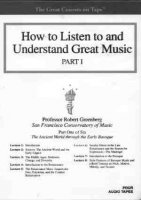
How to Listen to and Understand Great Music, by Robert Greenberg; a Teaching Company lecture
I've said it before: For accessible, serious, high-quality, adult-level educational materials (DVD, CD, mp3 download) it's hard to beat The Teaching Company. Robert Greenberg is one of my favorite lecturers, and this—so far—my favorite of his courses.
Here are the titles of the 48 lectures, as you can buy the course today. It is now onto its third edition; our version, which is so old we bought it on cassette tapes,* differs in minor ways.
- Music as a Mirror
- Sources—The Ancient World and the Early Church
- The Middle Ages
- Introduction to the Renaissance
- The Renaissance Mass
- The Madrigal
- An Introduction to the Baroque Era
- Style Features of Baroque-era Music
- National Styles—Italy and Germany
- Fugue
- Baroque Opera, Part 1
- Baroque Opera, Part 2
- The Oratorio
- The Lutheran Church Cantata
- Passacaglia
- Ritornello Form and the Baroque Concerto
- The Enlightenment and an Introduction to the Classical Era
- The Viennese Classical Style, Homophony, and the Cadence
- Classical-era Form—Theme and Variations
- Classical-era Form—Minuet and Trio: Baroque Antecedents
- Classical-era Form—Minuet and Trio Form
- Classical-era Form—Rondo Form
- Classical-era Form—Sonata Form, Part 1
- Classical-era Form—Sonata Form, Part 2
- Classical-era Form—Sonata Form, Part 3
- The Symphony—Music for Every Person
- The Solo Concerto
- Classical-era Opera—The Rise of Opera Buffa
- Classical-era Opera, Part 2—Mozart and the Operatic Ensemble
- The French Revolution and an Introduction to Beethoven
- Beethoven's Symphony no. 5 in C Minor, op. 67, Part 1
- Beethoven's Symphony no. 5 in C Minor, op. 67, Part 2
- Introduction to Romanticism
- Formal Challenges and Solutions in Early Romantic Music
- The Program Symphony—Berlioz's Symphonie fantastique, Part 1
- The Program Symphony—Berlioz's Symphonie fantastique, Part 2
- 19th-Century Italian Opera—Bel Canto Opera
- 19th-Century Italian Opera—Giuseppe Verdi
- 19th-Century German Opera—Nationalism and Experimentation
- 19th-Century German Opera—Richard Wagner
- The Concert Overture, Part 1
- The Concert Overture, Part 2
- Romantic-era Musical Nationalism
- Russian Nationalism
- An Introduction to Early 20th-Century Modernism
- Early 20th-Century Modernism—Claude Debussy
- Early 20th-Century Modernism—Igor Stravinsky
- Early 20th-Century Modernism—Arnold Schönberg
Forty-eight lectures of 45 minutes each sounds long and intimidating, but even at that length this is a brief, introductory, whirlwind tour of music history—and it never drags. I find it easy to listen to while driving, and well worth hearing more than once.
My recommendation for this course is as high as I can give, with one small caveat. Greenberg gears his lectures to adults, specifically college students, and he has obviously learned how to keep the attention of the teenage boys in his classes: his brief composer biographies sometimes include their sexual proclivities, and if there's musical reference he sees as orgasmic, he doesn't hesitate to mention it. (He also describes musical stomach rumbles and heartbeats.)
As music history, How to Listen to and Understand Great Music has received the endorsement of our favorite graduate of the Eastman School of Music, so I know it's good. 
That endorsement goes something like this: everything I've retained about music history I learned from Greeberg's lectures. His explanations of musical form gave me a firm basis from which to follow music theory courses and he was by far the most interesting and well prepared college professor I ever had - and I had some great teachers.
Of the many Teaching Company lecturers I've heard, I enjoy Greenberg the most.
I'm looking forward to getting some of his other courses.


